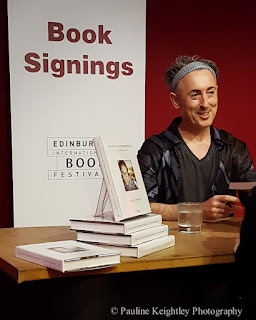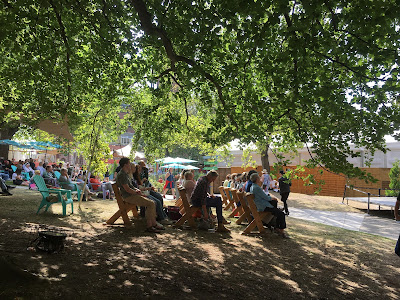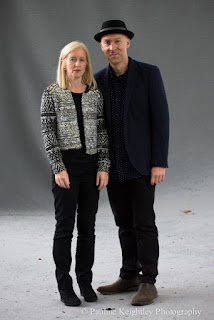Former Scotland’s first minster Nicola Sturgeon, was interviewed by journalist Kirsty Wark at the McEwan hall to discuss her newly released memoir Frankly: as part of the Edinburgh International book festival 2025,
Wark: Sturgeon was first elected in 1991 and now 33 years later here is her memoir Frankly. She writes about her anxiety and being introverted – which she had to work to overcome. But that masking came at a cost. In eight and a half years she won eight elections. Sturgeon reflected that these were volatile times and an incredible period in Scottish history.
Wark commented that Alex Salmond looms large in her book. Nicola replied that he was a strong, charismatic leader and a force for good. They complimented each other. His approval mattered to her and his disapproval counted. Was it coercive control, Kirsty asked, Nicola didn’t believe so.
The White Paper, Stronger for Scotland, Salmond couldn’t do the details and he never fully read the hundreds of pages Nicola believes, on his trip to China. (I have to assume the main people who read all the hundreds of pages, would have been unionist opponents). Alex both undermined and bolstered her. He was integral to her life and she felt a profound sense of sadness at his death. Alex advised her that her then husband Peter Murrell should not be chief executive – all rather poignant now. She spoke of all the optimism around the inydref.
Sturgeon’s Record in Office, what was she proud of? She mentioned the Pre school education while this has still not reduced the attainment gap. Nicola said she was proud of Baby Box, doubling early years support and the Scottish child payment – but all this needs to work through the system. Nicola commented that poverty is a big part of the problem. She set up a National investment bank.
The Trans issue was a bruising time and highly polarising. Sturgeon wondered, could there have been a less divisive way? The tenor of the debate has been vicious, with all the prejudices of the far right and that these extremes need to be ignored. She appeared very tense during the trans chat.
The general election 2017. She had a severe chest infection. and thought she would collapse at the first leaders debate. Salmond lost his seat and he then refused to take her calls.
The trial and acquittal of Alex Salmond - There was no evidence of a conspiracy: who leaked the story she questioned, as journalists didn’t know. The dark arts of media manipulation, the leak turned him into a victim. He said he behaved badly, with at times inappropriate behaviour.
Wark questioned was she collegiate enough, was she too insular?
Nicola said she was enjoying being single and that she now hopes to travel maybe to Europe, to lay aside the glass bowl of Scottish politics. She was very young getting into politics. She spoke of reading more books – my passion, solace and inspiration. Wark mentioned the FMs Reading Challenge and support for libraries.
She said that things are stuck here in Scotland, but that they can come unstuck suddenly. There is no magic solution and that we must connect to the real challenges of poverty and the economy. After her chat one man said that he had lived over thirty years in Hong Kong and returned to a Scotland transformed. This was a very positive chat, with a supportive audience with clearly many SNP voters!
Many have questioned why the two Big Beasts of Scottish politics of our devolution era have ended up in the justice system: have ended up being hounded. What’s really going on? Herald journalist Iain MacWhirter, has questioned this on BBC Radio Scotland, asking why this has happened. After all we don’t have former PMs in the courts, even as we know there has been gross negligence and corruption. Both Sturgeon and Salmond have been taken in for questioning, and subsequently found innocent of all charges. (Salmond of inappropriate behaviour, Sturgeon of embellishment. And that big tent outside Nicola’s house).










.jpg)








.jpg)
.jpg)



.jpg)




.jpg)

.jpg)






.jpg)

.pk.jpg)




.jpg)



